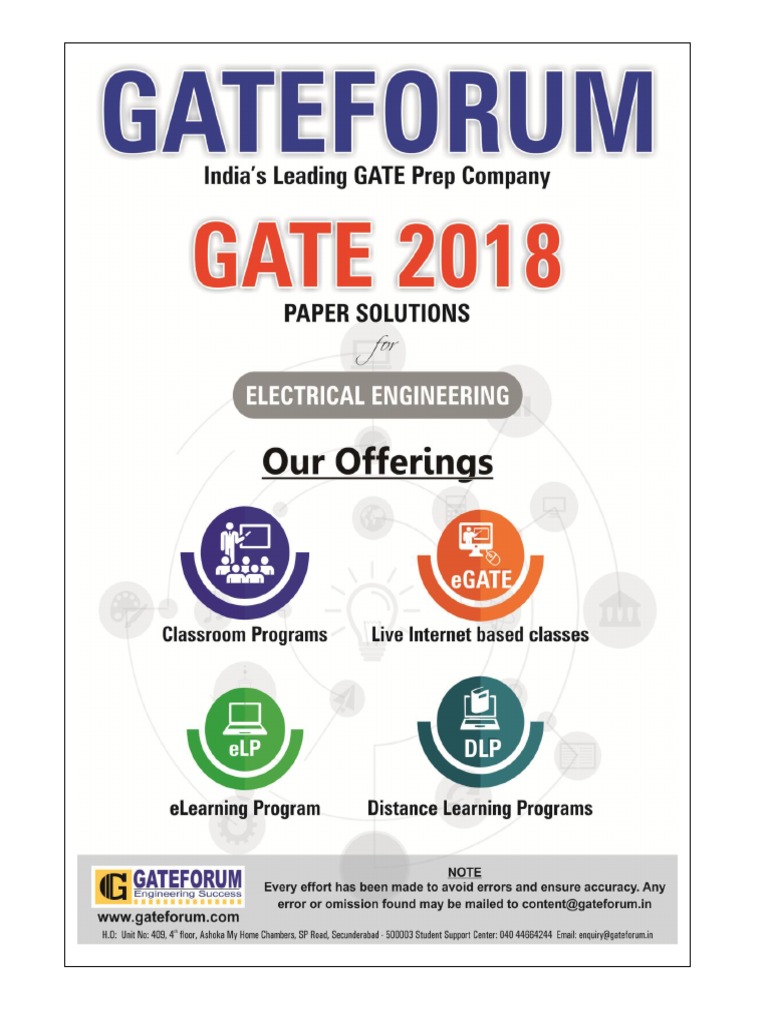Preparing for the Graduate Aptitude Test in Engineering (GATE) can provoke a sense of excitement mixed with trepidation. Especially for Electrical Engineering (EE) aspirants, the question often arises: What are the best GATE materials for EE? The wealth of resources available can both illuminate and obscure the path to success. With a plethora of books, online resources, coaching materials, and past papers, how does one distill an effective study plan? Herein lies the challenge—navigating these myriad choices without succumbing to overwhelm.
First and foremost, foundational textbooks serve as the bedrock for GATE preparation. In the realm of Electrical Engineering, classic texts such as “Electrical Engineering: Principles and Applications” by Allan R. Hambley and “Network Analysis” by M.E. Van Valkenburg provide crucial insights. These texts not only encompass the axioms of electrical circuits but also unravel the complexities of engineering applications. For aspirants, the intimate understanding of fundamental concepts gleaned from these sources is indispensable.
Transitioning from theoretical knowledge to exam readiness, various specialized guides, including “GATE Electrical Engineering” by G.K. Publications, offer comprehensive overviews of topics featured in the exam. These books typically include systematic problem sets and detailed solutions, heightening the learner’s problem-solving acuity. Moreover, scholars recommend focusing on the latest editions of these guides, as GATE syllabi evolve over time, reflecting advancements in technology.
In addition to textbooks, previous years’ question papers are an invaluable resource. They provide insights into question patterns, difficulty levels, and topics frequently included in the exam. Analyzing past GATE papers cultivates a strategic mindset critical for managing time during the actual examination. Many aspirants adopt a cyclical study approach—solving these past papers repeatedly until they reach a level of confidence and fluency in the potential questions. Combining this practice with mock tests can simulate the rigorous atmosphere of the actual examination, further enhancing preparedness.
In the digital age, online resources and platforms offer innovative alternatives to traditional learning. Renowned websites such as NPTEL (National Programme on Technology Enhanced Learning) and various MOOCs (Massive Open Online Courses) provide access to expert lectures and interactive content. Supplementing textbook study with online lectures can facilitate a multidimensional understanding of intricate topics like Control Systems and Signals and Systems. Moreover, you may find avenues for peer interaction and discussion, enriching your learning experience.
Isn’t it intriguing how collaborative learning can amplify individual comprehension? Engaging with study groups—whether in person or virtually—can inject a degree of dynamism into the preparatory process. When students share insights and tackle problems together, learning becomes a synergistic effort. Furthermore, platforms like Telegram and WhatsApp are popular among GATE aspirants for sharing resources and the latest updates regarding exam patterns and notifications.
Furthermore, mobile applications dedicated to GATE preparation have proliferated, providing on-the-go access to study materials. Apps such as GATE Academy and Testbook facilitate the review of concepts through quizzes and flashcards. The immediacy of mobile access allows for periodic revision amidst a busy schedule. However, the challenge remains: discerning which app aligns best with one’s learning style and curriculum requirements. Hence, reviewing user feedback can provide insights into the utility of such resources before full commitment.
Additionally, reference materials such as “Fundamentals of Electric Circuits” by Charles Alexander and Matthew Sadiku, along with “Electrical Machines, Drives, and Power Systems” by Eugene I. jury, fortify a deeper understanding of core principles. Delving into more specialized topics, these references can illuminate advanced concepts and applications, crucial for aspirants aiming for top-tier ranks.
As the preparation progresses, physical health and mental well-being cannot be overlooked. Maintaining a balanced lifestyle, complete with regular exercise, nutritious meals, and adequate rest, primes the brain for optimal learning. The intricate nexus between mental clarity and cognitive performance underscores the importance of nurturing one’s well-being during this rigorous journey.
Moreover, inducing a disciplined study routine yields benefits that ripple into one’s comprehension and retention. Establishing a timetable that allocates specific time slots for each subject creates accountability. Subsequently, intertwining concepts studied across subjects can further consolidate knowledge—a technique that yields dividends during revision periods.
Towards the zenith of preparation, aspirants must also cultivate the art of stress management. Exam scenarios can rouse anxiety levels, and engaging in mindfulness practices, such as meditation or deep-breathing exercises, can mitigate these feelings. Establishing an examination strategy that incorporates time management techniques—such as Bucketing (filtering questions based on difficulty)—can further bolster confidence as the day approaches.
In conclusion, discovering the best GATE materials for Electrical Engineering is a nuanced endeavor. It entails a judicious blend of foundational textbooks, specialized guides, problem sets from previous years, digital resources, collaborative learning initiatives, and healthy lifestyle choices. The sum of these components can effectively augment one’s readiness for the GATE exam. Thus, as one embarks on this academic expedition, the challenge is not merely to gather resources but to refine them into a coherent, personalized study plan that transforms potential energy into kinetic achievement on exam day.










